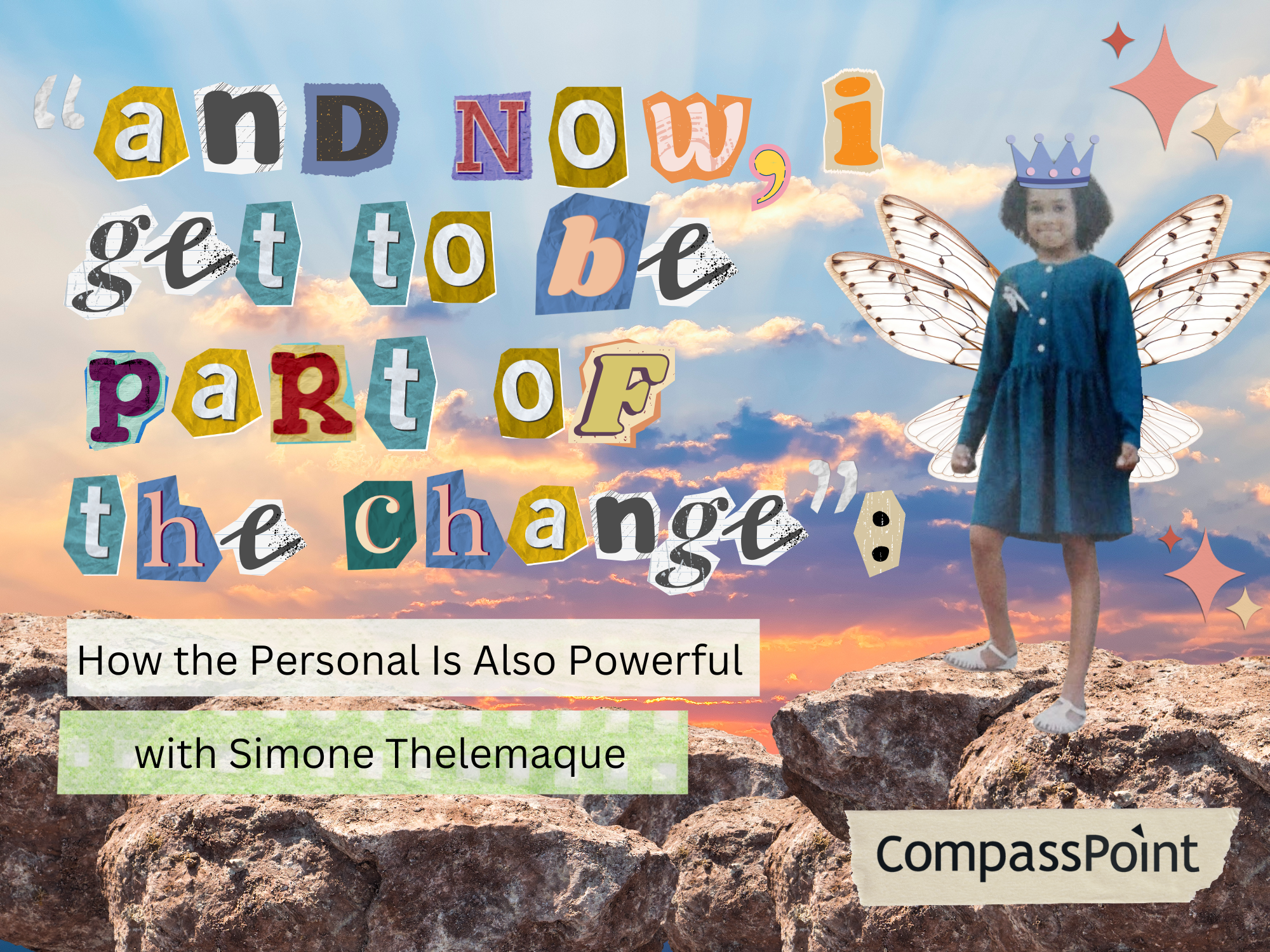[Image description: A collage art piece featuring a smiling young Simone standing on some rocks while wearing a teal dress and white shoes, her hands balled into fists. She has a paper crown adorning her head and fairy wings spread out behind her. The title of the blog is spelled out in magazine cutout style letters to her left, with a sunset-lit sky and clouds in the background.] Collage art by Learkana Chong
CompassPoint Project Director Simone Thelemaque looks back on her journey into leadership and reflects on how being witnessed, listened to, and invited in by others became a catalyst for her stepping into her own power.
In my time at CompassPoint, I have done a lot of what many would consider to be acts of leadership, or “stepping into my power.” I have convened and facilitated my peers, Board and executive leadership, as well as program participants for connection, info sharing, and decision-making. I have managed projects from start to finish; led teams, retreats, meetings, and proposals. I have held the title of “Project Director” for well over a year now. Despite all of this, I still experience imposter syndrome, and find myself on occasion having to navigate deep insecurities around my ability or capacity to make a meaningful impact.
To be honest, I think this is because I am still healing from the impacts of past traumatic experiences in childhood and in the workplace that left me feeling overlooked and invisible. It is an ache that lingers, woven into the fabric of my experiences. From a young age, I felt like an outsider, watching from the edges as teams formed, as leadership opportunities passed me by, as social circles tightened without space for me. Somewhere along the way, I internalized the lesson: I was different. I was not worthy of belonging. And so, I shrank.
The structures around me—schools, workplaces, social spaces—echoed this belief. They were built on foundations of imperialism, white supremacy, patriarchy, and oppression, shaping not just the policies but the very air I breathed, the ways we moved around one another. Consciously or unconsciously, these systems whispered limitations into my ear, and I, like so many before me, carried them as truths.
But in 2018, something shifted. I walked through the doors of CompassPoint as an Operations Coordinator, uncertain of what this place would ask of me, uncertain of what I could allow myself to hope for. In my very first week, I found myself in a staff meeting. Almost by instinct, I turned to the Executive Director and asked if I could get her something to drink. A quiet pause stretched between us before she gently responded, "No, I'll get it myself."
And in that silence, something cracked open. I noticed myself: how I had already assumed a position of service, how I had accepted a dynamic that was never named but deeply felt. That first month, I filled the space with self-deprecating jokes, small gestures of submission, as if to preemptively soften any judgment, as if to say, "I know my place."
But something else was happening, too. Day by day, moment by moment, I was met with something new: colleagues who saw me, who invited my voice into the room, who named power and designed meetings where I was meant to contribute. A Project Director asking for my input on an organizational decision—one moment. A team rethinking hierarchies, making space—another moment.
These were seeds of something different, something liberating. Over the past seven years, as I stepped into HR and organizational culture roles, I held onto these moments, these possibilities. Some of my most treasured experiences have been during interviews and onboarding, sitting with someone in their vulnerability and choosing, deliberately, to offer care. To witness them, to remind them that their humanity is non-negotiable. To be the presence that I once longed for.
I wish little Simone had seen this sooner. I wish the teachers, the coaches, the early bosses had modeled it for me. But it is what it is. And now, I get to be part of the change.
Shifting power in service of equity and justice in our organizations does not always emerge through sweeping systemic reform. Often, they begin in the quiet, in the personal. In the way we greet someone, in how we share space, in the subtle yet profound shifts in our daily interactions. The question is, what does this look like in practice? How do I choose to shift my own habits to create belonging for and build power with those around me? What unspoken rules do I need to unearth, to interrogate, to replace with something just and true?
I am still doing this work. I will always be doing this work.
And if you are ready to explore these questions, if you are ready to untangle the habits of white supremacy from internally held beliefs or self-narratives, to build relationships rooted in psychological safety, to practice the values of equity and justice not just in theory, but in the marrow of your daily interactions, please join us. All CompassPoint workshops are powerful (okay, yes, my bias may be showing!), but if you're looking for workshops that focus on our sphere of control (ourselves) towards healthier workplaces, I’d recommend:
- Facilitation Skills: Creating Powerful and Purposeful Meetings – where we explore how meeting spaces can be fertile ground for equity and power-sharing. (See also – Facilitation Skills for BIPOC Leaders)
- Coaching Skills for Leaders – where we dive into coaching as a tool and practice for empathy, and supporting others with their self-determination. (See also – Coaching Skills for BIPOC Leaders)
- Supervision: Relationships and Structures That Help Us Thrive – designed for those who directly support others or shape workplace experiences, this workshop offers transformational approaches that move beyond the tired, stale, and outdated status quo. (See also – Supervision for BIPOC Leaders)
We are learning and unlearning together. And until then, I will be holding you with care and love, because you deserve it.
– Simone





Submit a comment